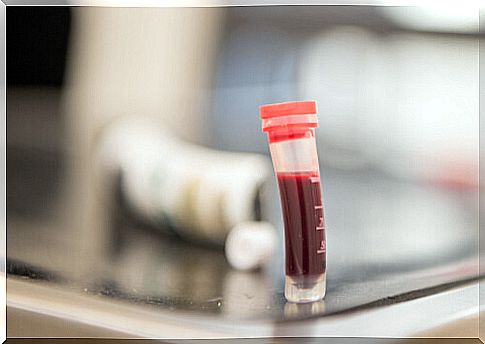Blood Tests In Dogs: When Is It Necessary?

Surely, whether for health reasons or for a simple medical check-up, all our readers have had to go through the blood extraction room on some occasion. The blood test is, without a doubt, the most versatile, effective and recurrent test, used both in veterinary medicine and in human pharmacology to complement many diagnoses. Next, we will explain when it is necessary to perform a blood test in dogs.
What is a blood test?
A blood test is a diagnostic test that involves drawing whole blood from the patient for later analysis. This definition, simply stated, may be somewhat simple as to deserve the praise that the server is lavishing on said test. Nothing could be further from the truth:
The blood is responsible for transporting, in addition to nutrients, oxygen, waste, and many other compounds that provide an invaluable overview of the state of the body. We could say that the blood test constitutes a basic summary of the state of health of the living being.
Depending on the blood fraction used for the analysis, we can subdivide the blood analysis into two tests:
- Hemogram: it is responsible for analyzing the cellular fraction of the blood. Through this test, useful and varied information about red blood cells, white blood cells or platelets can be obtained.
- Biochemistry: part of the blood analysis in charge of analyzing the plasma fraction of the blood. Through this test, all the chemical compounds transported and present in the blood can be assessed. For example, hormones, enzymes, or electrolytes.

When is it necessary to perform a blood test on a dog?
It is recommended to perform a blood test at the slightest indication that the situation requires it. Here are some examples of circumstances in which this test may be of interest.
Disease
First cause in which the blood test is justified and recommended. Logically, it depends on the criteria of the clinical veterinarian in his diagnostic evaluation. For example, for a corneal ulcer, such a test would not be justified. On the other hand, there are many pathological processes that we can approach by conducting a blood test. As a summary, these are some of the most relevant:
- Kidney pathologies.
- Liver problems
- Pancreatic pathologies.
- Hormonal disorders.
- Allergy testing.
- Bone marrow disorders.
- Gastrointestinal disorders.
Geriatric checkups
When dogs reach a certain age and begin to age (the age of aging depends on the size of the animal, large dogs doing it before), it is advisable to carry out a basic blood test with some frequency.
The frequency will vary depending on the needs of each animal. Generically, we might recommend a basic blood test every six months. The purpose of carrying out this test is to provide a global vision of the dog’s state of health, and to detect early the existence of any disease that may have remained hidden.
At this point, it should be remembered that, on many occasions, there is a relevant alteration in the blood test, without symptoms of disease yet. In all animals, and especially in geriatric animals, early diagnosis and treatment represents an added percentage of success against the possible disease.

Preoperative checkup
Before performing any type of surgical intervention, it is always advisable to perform a preoperative blood test. The purpose of this test is to assess the general health of the dog.
In addition, the test analyzes certain parameters that could increase the anesthetic risk during the intervention, such as circulating proteins in the blood or kidney health. On the other hand, other parameters evaluated are related to blood clotting times, very valuable information to be able to carry out the intervention minimizing the complications derived from the existence of a coagulation disorder.
In conclusion, we hope to have highlighted the valuable diagnostic contribution that blood tests make. These are some examples that may require this analysis. However, the performance of this test will always be subject to the discretion of the veterinary clinician. So, whenever necessary, put a blood test on your dog’s life, his health will appreciate it.









